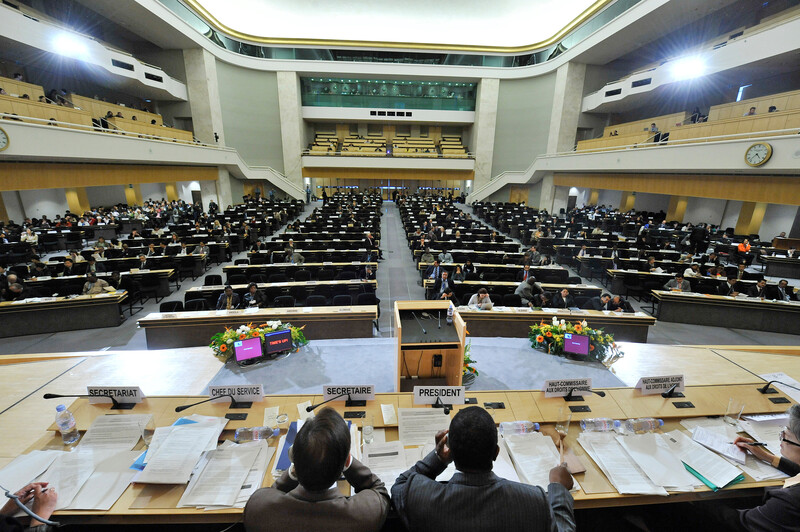The Electronic Intifada 9 September 2011

The September meeting is the third review conference of the Durban Declaration; the second was held in Geneva in 2009.
UN PhotoUNITED NATIONS, (IPS) - A high-level UN meeting on racism, scheduled to take place later this month, looks set to be dominated by questions relating to Israel’s treatment of the Palestinians.
Expressing fears that the meeting might turn out to be anti-Israel, several Western states, including Canada, Germany, the United States, Italy, Austria, the Netherlands, the Czech Republic and Australia, have indicated they will not participate.
The boycott is the result of an intense campaign by Israel, which has branded the meeting “anti-Semitic” even before it could get off the ground.
Still, an overwhelming majority of the UN’s 193 member states — along with dozens of human rights activists and organizations — are expected to actively participate in the meeting, scheduled to take place on 22 September during the 66th session of the UN’s General Assembly.
The Israeli government has objected to the meeting, which will mark the tenth anniversary of the 2001 Durban Declaration and Programme of Action (DDPA) on racism, primarily on the grounds that it may single out Israel for criticism for its discriminatory practices against Palestinians.
A mass pro-Israel rally against the high-level meeting and efforts by the Palestinian Authority to secure international recognition of a Palestinian state is to take place outside the United Nations on 21 September.
Joseph E. Macmanus, acting assistant secretary for legislative affairs at the US State Department, has said that the United States will not participate in what he called “the Durban Commemoration” meeting.
Last December, the US voted against the resolution establishing this event because “the Durban process included ugly displays of intolerance and anti-Semitism, and we did not want to see that commemorated,” he said.
Right-wing governments back Israel
Rashid Khalidi, Edward Said Professor of Arab Studies in the Department of History at Columbia University, said it is not surprising that Israel should have been supported by the governments of Italy, the Netherlands, Canada and the Czech Republic, all of them right-wing and all hostile to Palestinian aspirations, in opposing an effort to commemorate a landmark event in the global struggle against racism.
“The incessant effort to smear the Durban conference by Israel and its allies is intended to distract attention from the systematic legalized discrimination which is inherent not only in the 44-year old occupation of the territories seized in 1967, but also in Israel’s treatment of 20 percent of its own citizens who constitute the Arab minority,” he added.
The upcoming meeting, also called Durban III, is the third review conference of the Durban Declaration, the second (Durban II) being held in Geneva in 2009.
Polly Truscott, Amnesty International’s deputy representative at its office at the United Nations, said, “We of course hope all governments will take part in Durban III and renew their efforts to implement the Durban Declaration and Programme of Action [DDPA].”
She said true conviction in combating racism requires governments to be there, to stand up for what’s right, and to reject forcefully what’s objectionable.
“Governments need to demonstrate that, in spite of any political controversy around the commemoration, they’ll remain committed to combating racism, including commitment to the DDPA,” she declared.
Special hostility for Israel?
Chris Toensing, executive director and editor of the Washington-based Middle East Report, said that Israel’s objection, as usual, will be that Israel is singled out for criticism in the Durban Declaration in a way that smacks of special hostility for Israel among the drafters and, by extension, the UN General Assembly.
He said Israel will not dispute the specific charge in the declaration, namely that Palestinians are under “foreign occupation” and therefore are denied many basic national and human rights.
“So the objection is a diversionary tactic meant to shift attention away from Israel’s policies,” he said.
That said, he pointed out, it is true the declaration does not name another specific location of race-based discrimination in the contemporary world.
At the least, the drafters made a tactical error here, if their intent was to help the Palestinian cause, because Israel’s objection is technically sound, he added.
The Holocaust is the only specific example of genocide listed in the declaration, appearing after enslavement of Africans and colonialism as historical evils that the declaration seeks to redress.
“Though one might argue that the Holocaust, in scale and mechanisation, should indeed be considered sui generis, in the context of the declaration, the mention of the Holocaust appears to be an attempt to ‘balance’ the mention of Palestinian suffering,” said Toensing.
By the same token, he argued, it is not clear why anti-Semitism or Islamophobia should be given specific mention, when there are so many other specific types of racial-religious prejudice in today’s world.
In a letter to New York Senator Kirsten Gillibrand, Macmanus of the State Department said: “We share your concern about the Durban commemoration’s timing and venue as just days earlier, we will have held solemn ten-year memorials for those murdered in the September 11 terrorist attacks.”
In 2009, after working to try to achieve a positive, constructive outcome in the Durban Review Conference [Durban II], “we withdrew from participating because the conference reaffirmed the original 2001 Durban Declaration, which unfairly singled out Israel and included language inconsistent with US traditions of robust free speech.”
All rights reserved, IPS - Inter Press Service (2011). Total or partial publication, retransmission or sale forbidden.





